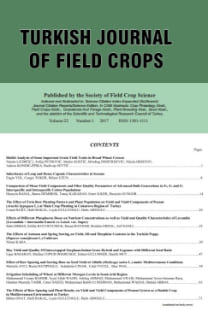SCREENING OF COTTON CULTIVARS FOR DROUGHT TOLERANCE UNDER FIELD CONDITIONS
Cotton, Gossypium hirsutum L. water stress, selection criterias,
- ISSN: 1301-1111
- Yayın Aralığı: Yılda 2 Sayı
- Başlangıç: 1996
- Yayıncı: Tarla Bitkileri Bilimi Derneği
Junwei WANG, Hongzhan LIU, Gaisheng ZHANG, Junsheng WANG, Qingsong BA, Yulong SONG, Pengfei ZHANG, Shoucai MA, Na NIU, Long CHEN, Huixue CHE
Suleyman TEMEL, Bilal KESKIN, Ugur SIMSEK, Ibrahim H. YILMAZ
THE EFFECTS OF PLANT DENSITY AND YEAR ON YIELD OF PURPLE CONEFLOWER (Echinacea purpurea (L.) MOENCH)
Leyla Sezen TANSI, Sengul KARAMAN, Ozlem TONCER, Selin GIDIK
DISTRIBUTION OF WHEAT PROTEIN COMPONENTS UNDER DIFFERENT GENETIC BACKGROUNDS AND ENVIRONMENTS
Daniela HORVAT, Georg DREZNER, Rezica SUDAR, Gordana ŠIMIĆ, Krešimir DVOJKOVIĆ, Valentina ŠPANIĆ, Damir MAGDIĆ
Elif KARLIK, Cuneyt UCARLI, Filiz GUREL, Semian Karaer UZUNER, Muhammad Qasim SHAHID
Ozlem ONAL ASCI, Yeliz KASKO ARICI, Zeki ACAR
Volkan SEZENER, Huseyin BASAL, Ceng PEYNIRCIOGLU, Talih GURBUZ, Kadir KIZILKAYA
NITROGEN FERTIGATION TO IMPROVE NITROGEN USE EFFICIENCY AND CRUDE PROTEIN ON SILAGE CORN
Front Cover, Back Cover and Editorial Board
Turkish Journal Of Field Crops
PERFORMANCE OF SOME FORAGE GRASS SPECIES IN HALOMORPHIC SOIL
Suleyman TEMEL, Ibrahim H. YILMAZ, Ugur SIMSEK, Bilal KESKIN
